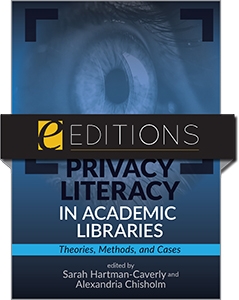
Primary tabs
You don't need to be an ALA Member to purchase from the ALA Store, but you'll be asked to create an online account/profile during the checkout to proceed. This Web Account is for both Members and non-Members. Note that your ALA Member discount will be applied at the final step of the checkout process.
If you are Tax-Exempt, please verify that your account is currently set up as exempt before placing your order, as our new fulfillment center will need current documentation. Learn how to verify here.
- Description
- Table of Contents
- About the authors
Privacy is not dead: Students care deeply about their privacy and the rights it safeguards. They need a way to articulate their concerns and guidance on how to act within the complexity of our current information ecosystem and culture of surveillance capitalism.
Practicing Privacy Literacy in Academic Libraries: Theories, Methods, and Cases can help you teach privacy literacy, evolve the privacy practices at your institution, and re-center the individuals behind the data and the ethics behind library work. Divided into four sections:
- What is Privacy Literacy?
- Protecting Privacy
- Educating about Privacy
- Advocating for Privacy
Chapters cover topics including privacy literacy frameworks; digital wellness; embedding a privacy review into digital library workflows; using privacy literacy to challenge price discrimination; privacy pedagogy; and promoting privacy literacy and positive digital citizenship through credit-bearing courses, co-curricular partnerships, and faculty development and continuing education initiatives. Practicing Privacy Literacy in Academic Libraries provides theory-informed, practical ways to incorporate privacy literacy into library instruction and other areas of academic library practice.
Dedication
Preface
Alexandria Chisholm
Acknowledgments
Introduction
Alexandria Chisholm
Part I. What Is Privacy Literacy?
Chapter 1. Privacy as Respect for Persons: Reimagining Privacy Literacy with the Six Private I’s Privacy Conceptual Framework
Sarah Hartman-Caverly and Alexandria Chisholm
Chapter 2. Data Is Not a Mirror: A Privacy-Digital Wellness Model as Preservation of the Incomputable Self
Alexandria Chisholm
Chapter 3. Developing a Privacy Research Lab: Activities and Impact of Prilab
Mary Francis and Dustin Steinhagen
Part II. Protecting Privacy
Chapter 4. Protecting Patron Privacy in Access Services: Looking at the Laws
Jamie Marie Aschenbach
Chapter 5. Putting Privacy into Practice: Embedding a Privacy Review into Digital Library Workflows
Virginia Dressler
Chapter 6. Libraries, Privacy, and Surveillance Capitalism: The Looming Trouble with Academia and Invasive Information Technologies
Andrew Weiss
Part III. Educating About Privacy
Chapter 7. The Promise of Theory-Informed Pedagogy: Building a Privacy Literacy Program
Alexandria Chisholm and Sarah Hartman-Caverly
Chapter 8. Preparing the Next Generation of Privacy Leaders?: The Intersection of Business Ethics and Privacy Education
Emily Mross
Chapter 9. Our Students Are Online Consumers: Using Privacy Literacy to Challenge Price Discrimination
Joshua Becker
Chapter 10. Privacy Literacy and Engineering
Paul McMonigle and Lori Lysiak
Chapter 11. Teaching Privacy Using Learner-Centered Practices in a Credit-Bearing Context
Scott W. H. Young and Sara Mannheimer
Chapter 12. Amplifying Student Voices: Developing a Privacy Literacy Conversation
Melissa N. Mallon and Andrew Wesolek
Part IV. Advocating for Privacy
Chapter 13. Understanding Student Perspectives on Learning Analytics to Enable Privacy Advocacy and Policy Design
Michael R. Perry, Andrew D. Asher, Kristin A. Briney, Mariana Regalado, Abigail Goben, Maura A. Smale, Dorothea Salo, and Kyle M. L. Jones
Chapter 14. Building a Culture of Privacy through Collaborative Policy Development
Margaret Heller
Chapter 15. Privacy Pedagogy: Aligning Privacy Advocacy with Course Design Standards
Lindsey Wharton, Liz Dunne, and Adam Beauchamp
Chapter 16. What Successful Students Know: Promoting Privacy Literacy and Positive Digital Citizenship through Credit-Bearing Courses and Co-Curricular Partnerships
Theresa McDevitt, Crystal Machado, Melissa Calderon, Jaqueline McGinty, Jennifer McCroskey, and Ann Sesti
Chapter 17. Lateral Privacy Literacy: Peer-led Professional Privacy Literacy Learning Experiences
Sarah Hartman-Caverly
Conclusion. Privacy Work is Library Work
Sarah Hartman-Caverly
About the Authors
Sarah Hartman-Caverly
Sarah Hartman-Caverly, MS(LIS), MSIS, is a reference and instruction librarian at Penn State Berks, where she liaises with Engineering, Business and Computing division programs. Sarah delivered her first privacy literacy workshop, “Is Big Data Big Brother?,” in 2014. She co-facilitated a faculty learning community examining learning analytics through a privacy lens in 2017 and a professional community of practice workshop on privacy in 2021. Sarah’s research examines the compatibility of human and machine autonomy from the perspective of intellectual freedom, and she publishes and presents on privacy literacy and other topics as part of this work. She earned her MS(LIS) and MS in information systems from Drexel University College of Computing & Informatics (then iSchool) and holds a BA in anthropology from Haverford College. Outside of the library, Sarah is an edible gardener, chicken herder, and homemaker. Together, Sarah and Alex Chisholm created the Penn State Berks Privacy Workshop Series, collaborate on privacy literacy research and professional development, and maintain the Digital Shred Privacy Literacy Toolkit.
Alexandria Chisholm
Alexandria Chisholm is an associate librarian at Penn State University Libraries and liaison to the Berks campus’ first-year experience program and science division. She has over ten years of reference and instruction experience at both private and public baccalaureate- and doctoral-degree granting institutions. Chisholm’s research focuses on privacy literacy, with special attention on digital wellness and algorithmic transparency as well as information literacy and student engagement. Together, Alex and Sarah Hartman-Caverly created the Penn State Berks Privacy Workshop Series, collaborate on privacy literacy research and professional development, and maintain the Digital Shred Privacy Literacy Toolkit.


